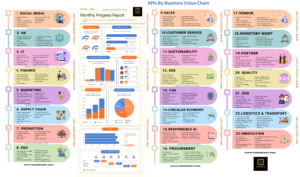Unlocking the Power of KPIs: How a KPI Calculator Can Transform Your Business Strategy
In today’s data-driven landscape, businesses across the globe are turning to Key Performance Indicators (KPIs) not just to track performance but to fundamentally enhance their operational strategies. KPIs offer invaluable insights into the effectiveness of various business processes, helping companies meet objectives and foster growth. Among the tools that magnify the utility of KPIs, KPI calculators stand out as essential for business leaders aiming to harness this power effectively.
What is a KPI - Key Performance Indicator ?
Key Performance Indicators (KPIs) are quantifiable measures used to gauge a company’s overall long-term performance. KPIs help organizations assess progress towards sales targets, customer engagement, operational efficiency, and other strategic goals. They vary by department and industry but universally serve as a cornerstone of strategic planning.

The Role of a KPI
A KPI Calculator is a tool that simplifies the measurement and analysis of KPIs. By allowing users to input actual figures against predefined targets, these calculators provide a clear and immediate visual representation of performance. Whether it’s tracking sales revenue, measuring marketing campaign effectiveness, or monitoring production output, a KPI calculator offers a straightforward method to evaluate success against objectives.
Integrating KPI Calculators into Business Strategy
Enhanced Decision-Making
- By providing real-time data comparisons, KPI calculators enable managers to make informed decisions quickly. This responsiveness is crucial in adapting strategies to meet evolving market conditions.
Goal Alignment Across Departments
- KPI calculators help align the objectives of different departments with the overall business strategy. This alignment ensures that all parts of the organization work towards common goals, optimizing resource allocation and efforts.
Increased Accountability
- When teams and individuals have clear KPIs measured through calculators, it increases accountability, motivating employees to focus on their targets and contribute positively to the company’s growth.
Improved Reporting
- KPI calculators facilitate the generation of consistent and accurate reports detailing performance metrics. These reports are vital for internal assessments and external communications with stakeholders.
Importance of KPIs in Different Industries
Key Performance Indicators (KPIs) are essential tools for measuring the success and progress of a business across various industry sectors. Their importance stems from their ability to provide quantifiable metrics that help organizations gauge the effectiveness of their strategies and operations. Here’s a detailed overview of the importance of KPIs in different industries:
1. Manufacturing
- Efficiency Optimization: KPIs in manufacturing often focus on production volumes, operational efficiency, machine uptime, and quality rates. They are critical for minimizing waste, reducing downtime, and optimizing resource allocation.
- Cost Control: Tracking cost-related KPIs helps manufacturers control production costs and improve profitability by identifying inefficiencies in the supply chain.
2. Retail
- Sales Performance: Retailers rely heavily on KPIs like daily sales, inventory turnover, and sales per square foot to make informed decisions about product placement, promotions, and stocking.
- Customer Satisfaction: KPIs such as customer retention rates and customer satisfaction scores are vital for understanding the consumer experience and devising strategies to improve service and retain customers.
3. Healthcare
- Patient Care Quality: KPIs in healthcare include patient satisfaction scores, readmission rates, and treatment effectiveness, which are crucial for monitoring the quality of care provided.
- Operational Efficiency: Efficiency metrics help healthcare facilities manage their resources effectively, ensuring that they can provide high-quality care while controlling costs.
4. Information Technology (IT)
- System Performance: IT KPIs such as system uptime, software bug rates, and response times to IT incidents are critical for maintaining the reliability and efficiency of IT services.
- Security: KPIs related to security breaches, the number of incidents resolved, and the time taken to close security tickets are vital for maintaining data integrity and security.
5. Finance
- Financial Health: Key financial KPIs include gross profit margin, net profit margin, ROI, and cash flow. These indicators are essential for assessing the financial health and stability of an organization.
- Risk Management: Risk-related KPIs help financial institutions monitor and manage risks associated with their operations and market dynamics.
6. Education
- Student Performance: Academic achievement rates, graduation rates, and student engagement metrics are significant for educational institutions to evaluate and improve educational outcomes.
- Resource Utilization: KPIs related to faculty utilization and administrative efficiency help educational institutions optimize their operations.
7. Logistics and Transportation
- Operational Metrics: KPIs like on-time delivery rates, fleet utilization, and average delivery time are crucial for optimizing logistics operations.
- Sustainability: With an increasing focus on sustainability, KPIs related to fuel efficiency and carbon emissions are becoming vital for companies looking to reduce their environmental impact.
The Role of Custom KPI Calculators
Custom KPI calculators serve as essential tools that allow businesses to input their actual and targeted values to gauge performance efficiently. These calculators help in making abstract numbers tangible and provide a clear picture of where a company stands concerning its predefined goals. Whether it’s measuring system uptime in IT, employee retention rates in HR, budget variance in finance, or average deal size in sales, a KPI calculator brings precision to your strategic planning and evaluation.
Benefits of Using a KPI Calculator
- Accuracy and Efficiency: Automates the calculation process, reducing errors and saving time compared to manual computations.
- Visibility: Offers clear insights into which areas are over or underperforming, guiding strategic adjustments.
- Scalability: Adapts to different levels of complexity and size within a business, providing value whether in small startups or large enterprises.
Sample KPIs and Their Impact:
IT (Information Technology)
- KPI Name: System Uptime
- Target Value: 99.5%
- Actual Value: 99.8%
- Interpretation: The IT department exceeded its uptime target, showcasing exceptional system reliability and maintenance. This not only enhances operational efficiency but also boosts client confidence in your technological capabilities.
HR (Human Resources)
- KPI Name: Employee Retention Rate
- Target Value: 90%
- Actual Value: 92%
- Interpretation: Achieving above-target retention rates indicates effective employee engagement and retention strategies, crucial for maintaining a skilled and motivated workforce.
Finance
- KPI Name: Budget Variance
- Target Value: 0% (i.e., no variance)
- Actual Value: -5%
- Interpretation: A negative variance suggests that the finance department managed to spend less than the budget, reflecting robust financial discipline and efficient resource management.
Sales
- KPI Name: Average Deal Size
- Target Value: $10,000
- Actual Value: $12,000
- Interpretation: Exceeding the target deal size points to the sales team’s ability to close larger deals, which can significantly impact the company’s revenue and growth.
In today’s data-driven business environment, having the ability to measure, analyze, and act on KPIs is indispensable. By integrating custom KPI calculators into your strategic planning, you can ensure that your business not only meets its targets but also sets new standards of excellence across all functions.










